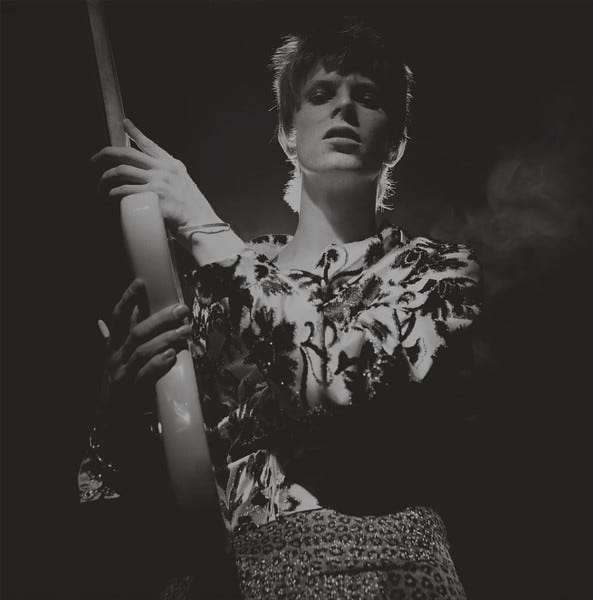
Sometimes, the only thing bearable is being in the presence of David Bowie’s music. I’m not the only one who pointed this out, but everything turned dark and sinister the day David Bowie died. Death is death, but when someone leaves a physical space, there is a shift on the Earth, and that goes with everyone who has experienced a death. A friend, a family member, an Uncle, a parent, or a rock n’ roll star. When death enters the picture, there is a violent and disgusting feeling of vastness, a space that can’t be filled. Then you have President No. 35 enter the picture, and anything intelligent becomes stupid.
On one level, it’s just marketing and filling the void with the product, but then if that product is music, it is something more. Selling memories is not a sin, but if you are like me, purchasing a memory is as if death didn’t happen. In principle, this is okay, but you must acknowledge that you are living under a shadow. We all have illusions, but you must keep your eyes and ears open because the world is changing, and not always for the better. The Right is on the rise, and one has to come to terms with the fact that damage has been done, and going back to the memory of a better time will not make troubles go away.
When I was eighteen, Ziggy Stardust meant the world to me. Bowie, Ziggy, and the off-shoots such as Lou Reed, Iggy Pop, and Mott the Hoople (all significant artists) reflected 1972 and 1973. It’s an interesting generation of music makers because all were very much part of the 1960s culture but stepped aside and advanced into the 70s, but with a different identity and approach to their past, which became a new narrative. When I first heard the Ziggy Stardust album in 1972, it was such a fresh moment; it defined life as I lived it. Listening to it now represents the past but not the present. It is already a historical or museum-like work.
The appeal for me regards the new compilation of Ziggy-era recordings, Rock n’ Roll Star!, which are the songs that he wrote/recorded before and during Ziggy. At the time, Bowie needed to update or incorporate them into the current show. The curious thing about Bowie is that he never seems to give up on one of his songs. It may not have been suitable for the Ziggy album or any of his albums, but he consistently works on them. His album Toy is an excellent example of how Bowie dealt with his inventory from the late 1960s. Although I listen to Ziggy Stardust, it is very much a work from the past, but for Bowie, I don’t think that album or any of his releases are truly over because he thought about them as living projects.
Death is usually the final period at the end of the sentence, but in Bowie’s case, it is just a comma in the middle of a long Thomas Bernhard-type paragraph. The music released after his passing is not essential but is a deliciously good part of the main dish, the original albums he recorded and released. I will write about these albums in detail in future posts. As of now, I’m reflecting on whether these recent recordings are decorative touches or serious commentary on albums like Ziggy Stardust.
We always want to see the Wizard behind the curtain working on the magic. Therefore, all the post-death Bowie releases reflect looking behind the curtain to see how the magic is done, especially when you observe or listen to studio recordings and how they have processed into becoming the complete work. So, listening to the early stages of a song like Ziggy Stardust or Lady Stardust is an exciting process to observe. Still, the differences are significant to the song’s structure or melody. On the other hand, Bowie's live albums that came out in the last eight years or so are more pleasurable because you see his songs as they are interpreted by the band and how he goes with the arrangements. Like hearing Thelonious Monk's recordings of his songs, each band or setting makes it familiar, yes, but there is a difference of great importance. I think the same goes for Bowie and his various bands. Although the band on his Look At The Moon! is his best lineup, I think it gave them more room to make noise because the band is small. In that manner, he is very close to his Ziggy Stardust classic lineup.
Pretty much all the classic Bowie releases are museum pieces. Still, the live albums and the demos/early recordings of those albums make them a living testament to his work's greatness, but for some, they occupy an empty space. I still feel the emptiness, and no matter how many reissues or new recordings are discovered, it is a vast space that, due to his death, can’t be filled. One has to live with that space and learn to deal with it.















The other day I wrote about his last Ziggy show and it seemed like he had a bad taste in his mouth over “Starman” which he rarely performed live. I couldn’t find any interviews where he was asked about it. Seemed odd to turn one’s back on a song that relaunched his career. Do you have any insights to the slight?
https://www.setlist.fm/news/07-24/setlist-history-david-bowies-last-show-as-ziggy-stardust-5bd6a7e0
Bravo!